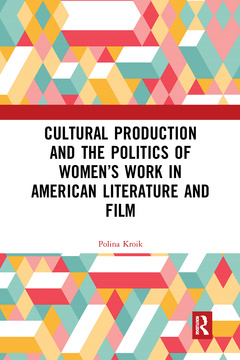Cultural Production and the Politics of Women’s Work in American Literature and Film Interdisciplinary Research in Gender Series
Auteur : Kroik Polina

Cultural Production and the Politics of Women?s Work in American Literature and Film emphasizes the interrelation among women?s workplace roles, modes of authorship, and processes of subject-formation, pointing to some of the reasons for the persistence of limiting gender roles and occupational hierarchies that arose during the first 60 years of the 20th century.
The book interrogates three common narratives: The rise of Fordism as a "masculine" mode of production and the transition to an era of "feminized" work; women?s liberation through the sexual revolutions; and the rise of a new form of literary authorship. Conversely, it suggests that women?s labor was integral to the operations of the Fordist business sphere, where, unlike at the factory, the white-collar office proletarian work was casualized and feminized. This book argues that this workplace was an important site of subject formation, affirming dominant ideologies through economic practices.
Analyzing work by Sinclair Lewis, Nella Larsen, Anita Loos, and Sylvia Plath, the book presents an alternative history of American modernism, one that is more attuned to gendered discourses of labor and class. By looking at the micropolitics of power within cultural institutions, this study moves beyond the dichotomies of exclusion/inclusion to interrogate the terms on which women and minorities worked as producers, and the ideas and experiences that consequently entered the field of intelligibility.
Introduction, 1 Mixing Business with Pleasure: The "Business Girl" and the Rise of Fordism in Sinclair Lewis’s ‘The Job’ and Winston Churchill’s ‘The Dwelling-Place of Light’, 2 Flappers and Professionals: The Cultural Politics of Edith Wharton’s Later Fiction, 3 "Beggars in Velvet Gowns:" The Politics of Work, Race, and Class in Nella Larsen’s Fiction, 4 "A Girl Can’t Go on Laughing All the Time" Anita Loos and the Hollywood Studio System, 5 "I Guess You Could Say I’ve a Call": Work, Gender and Class in Sylvia Plath’s Fiction and Poetry, Conclusion: The Neoliberal Office, Postfeminism in Mad Men, and the Rise of the Gig Economy
Polina Kroik holds a PhD in Comparative Literature from the University of California, Irvine. Her research focuses on gender, work, and migration in twentieth- and twenty-first-century literature and film. She has presented at numerous national conferences and contributed to peer-reviewed journals. Dr. Kroik teaches literature and writing at Fordham University and Baruch College, CUNY.
Date de parution : 12-2020
15.6x23.4 cm
Date de parution : 01-2019
15.6x23.4 cm
Thèmes de Cultural Production and the Politics of Women’s Work... :
Mots-clés :
Young Men; Great Divide; Cultural production; Fordism; women’s liberation; sexual revolution; Women’s Labor feminism; White-Collar work; secretarial work; Upwardly Mobile Middle Class; White America; Bell Jar; White Collar Workplace; Red Headed Woman; Gentlemen Prefer Blondes; Twilight Sleep; Female Clerical Workers; Female White Collar Workers; White Collar Office; Van Vechten; Helga Crane; Johnny Panic; Women Screenwriters; Modern Girl; Wharton’s Fiction; Ariel Poems; Occupational Solidarity; Wharton’s Critique; Black Bourgeoisie; Irving Thalberg; Uplift Ideology; Coworking Spaces



